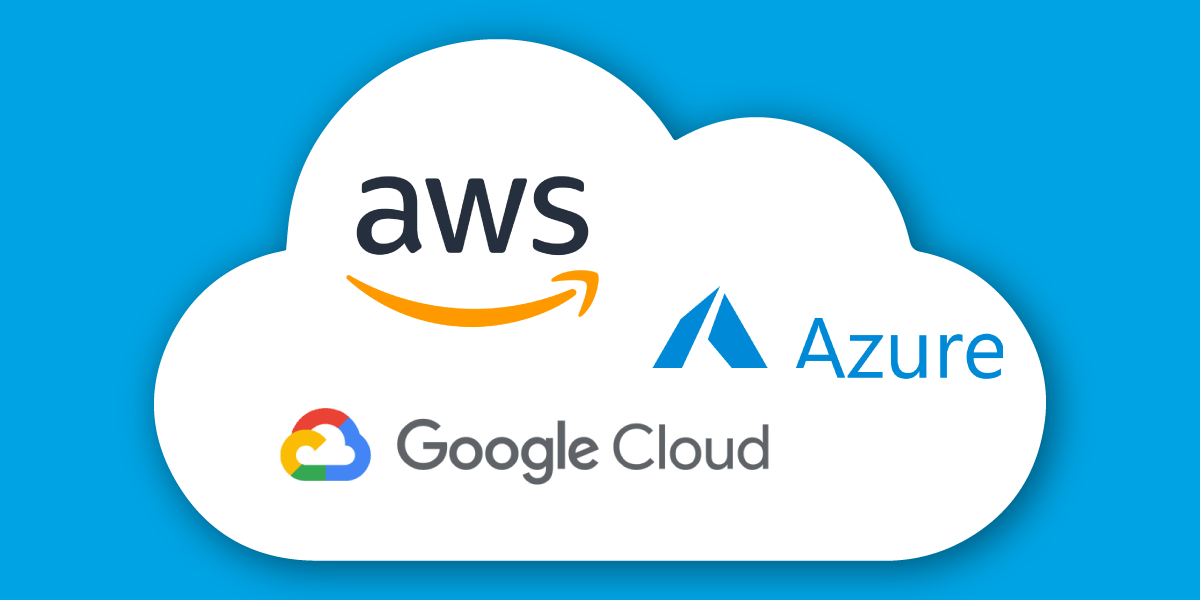- Understanding Cloud Computing
- Cloud Services
- Real-World Applications for Cloud Computing in Business
- Comparing Amazon AWS, Google Cloud, and Microsoft Azure
- Embracing Cloud Computing for Enhanced Business Growth
As an IT solutions provider, Weaver Technologies understands the importance of choosing the right cloud provider for your business. With the rapid growth of cloud computing, many companies are moving away from traditional data centers and embracing cloud technology. Amazon AWS, Google Cloud, and Microsoft Azure are three of the most popular cloud providers on the market today, each with their own strengths and weaknesses. In this article, we will compare and contrast these three cloud providers to help you make an informed decision.
Understanding Cloud Computing
Cloud computing is the delivery of computing services, including servers, storage, databases, software, analytics, and more, over the internet, which is often referred to as “the cloud.” Cloud computing provides businesses with a flexible and scalable way to access computing resources without having to invest in expensive hardware and infrastructure.
Cloud computing is typically provided by third-party service providers who operate large data centers filled with thousands of servers. Businesses can access these computing resources on-demand and pay only for what they use, similar to a utility bill.
Cloud Services
Cloud services are the various types of computing services that are provided by cloud computing providers. These services include infrastructure-as-a-service (IaaS), platform-as-a-service (PaaS), and software-as-a-service (SaaS).
Infrastructure-as-a-service (IaaS) provides businesses with access to computing resources such as servers, storage, and networking, which they can use to build their own applications and services. Platform-as-a-service (PaaS) provides businesses with a platform on which they can develop, run, and manage their applications without having to worry about the underlying infrastructure. Software-as-a-service (SaaS) provides businesses with access to software applications that are hosted and managed by the cloud provider.
Real-World Applications for Cloud Computing in Business
Cloud computing has many real-world applications in business, some of which include:
- Data Storage and Backup: Cloud storage services such as Amazon S3, Google Cloud Storage, and Microsoft Azure Blob Storage provide businesses with a cost-effective and scalable way to store and back up their data.
- Web Applications: Cloud platforms such as AWS Elastic Beanstalk, Google App Engine, and Microsoft Azure App Service provide businesses with a platform on which they can develop and deploy web applications without having to worry about the underlying infrastructure.
- Big Data Analytics: Cloud services such as AWS EMR, Google Cloud Dataproc, and Microsoft Azure HDInsight provide businesses with a scalable and cost-effective way to perform big data analytics.
- Disaster Recovery: Cloud-based disaster recovery services such as AWS Disaster Recovery, Google Cloud Disaster Recovery, and Microsoft Azure Site Recovery provide businesses with a way to quickly recover their IT systems in the event of a disaster.
- Collaboration: Cloud-based collaboration services such as Google Workspace, Microsoft 365, and Dropbox provide businesses with a way to collaborate on documents, spreadsheets, and other files in real time from anywhere in the world.
- Artificial Intelligence and Machine Learning: Cloud services such as AWS SageMaker, Google Cloud AI Platform, and Microsoft Azure Machine Learning provide businesses with a way to leverage the power of artificial intelligence and machine learning to improve their products and services.
Amazon AWS:
Amazon AWS is the undisputed leader in the cloud computing industry, with a market share of around 33%. AWS offers a wide range of services, including computing, storage, databases, analytics, and more. Its infrastructure-as-a-service (IaaS) model provides businesses with a flexible and scalable cloud computing environment that can be easily customized to meet their specific needs.
One of the main advantages of AWS is its extensive network of data centers, which are spread across the world. This ensures that businesses can choose a data center that is close to their customers, reducing latency and improving performance. Additionally, AWS offers a wide range of pricing options, from on-demand to reserved instances, making it easy for businesses to manage their cloud costs.
Google Cloud:
Google Cloud is the second-largest cloud provider, with a market share of around 8%. Google Cloud offers a wide range of services, including computing, storage, databases, machine learning, and more. Its platform-as-a-service (PaaS) model provides businesses with a more managed environment, allowing them to focus on building and deploying applications, rather than managing infrastructure.
One of the main advantages of Google Cloud is its focus on innovation. Google has been at the forefront of many technological advances, such as containerization and machine learning, and these technologies are deeply integrated into Google Cloud. Additionally, Google Cloud has a strong commitment to open-source software, which means businesses can easily integrate their existing technologies with Google Cloud.
Microsoft Azure:
Microsoft Azure is the third-largest cloud provider, with a market share of around 19%. Azure offers a wide range of services, including computing, storage, databases, analytics, and more. Its hybrid cloud model allows businesses to seamlessly integrate their existing on-premise infrastructure with the cloud, providing a more flexible and scalable environment.
One of the main advantages of Azure is its strong integration with Microsoft’s existing software and services, such as Windows Server and Office 365. This makes it an attractive option for businesses that are already heavily invested in Microsoft technologies. Additionally, Azure offers a wide range of security and compliance certifications, making it a good choice for businesses that need to comply with industry regulations.
Comparing Amazon AWS, Google Cloud, and Microsoft Azure
Amazon AWS is the undisputed leader in the cloud computing industry, with a market share of around 33%. AWS offers a wide range of services and has an extensive network of data centers spread across the world, providing businesses with flexibility and scalability. Google Cloud is the second-largest cloud provider, with a market share of around 8%. It has a strong focus on innovation and open-source software, which makes it attractive for businesses looking to leverage these technologies. Microsoft Azure is the third-largest cloud provider, with a market share of around 19%. It offers a hybrid cloud model that allows businesses to integrate their existing on-premise infrastructure with the cloud, making it an attractive option for companies heavily invested in Microsoft technologies.
When it comes to pricing, all three cloud providers offer a similar range of pricing options, with AWS being slightly cheaper for on-demand instances. In terms of performance, AWS has the largest network of data centers, while Google Cloud has a strong focus on innovation and open-source software. Azure’s hybrid cloud model makes it a good choice for businesses that need to integrate their existing on-premise infrastructure with the cloud.
Embracing Cloud Computing for Enhanced Business Growth
Cloud computing has emerged as a highly versatile and effective technology that offers a broad range of computing services to businesses, which can be accessed as per the requirements. From storing and backing up data to utilizing artificial intelligence and machine learning, cloud computing has become a vital component of contemporary businesses.
To gain maximum benefits from cloud computing, it is crucial for businesses to identify and choose the right cloud provider that suits their needs. Amazon AWS, Google Cloud, and Microsoft Azure are some of the leading providers of cloud services, and by evaluating their strengths and weaknesses, businesses can make informed decisions and harness the full potential of cloud technology.
At Weaver Technologies, we specialize in providing customized cloud solutions that are tailored to meet the unique requirements of your business. Our team of experts can help you choose the right cloud provider, develop a cloud strategy, and seamlessly migrate your data to the cloud. With our comprehensive cloud solutions, you can drive innovation, enhance efficiency, and accelerate business growth.







